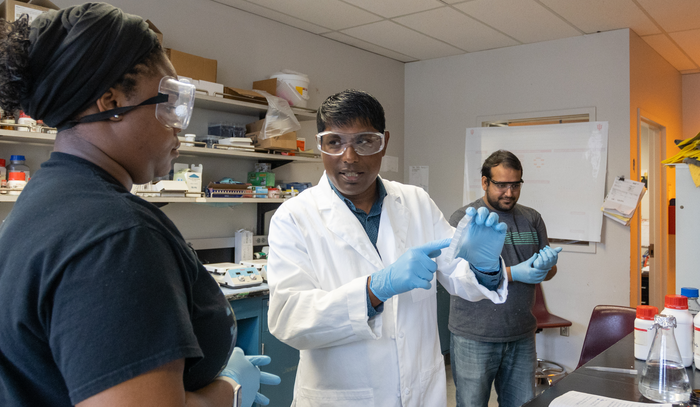As the BA.5 omicron variant continues to spread, health experts are increasingly preparing for a future in which such COVID-19 variants emerge, surge and recede similar to seasonal flu. An important part of staying on top of these changes will be the ability to quickly monitor the virus at a “population scale,” an effort that will require accurate and ultra-fast testing.

Credit: Photo by Chris Meyer, Indiana University
As the BA.5 omicron variant continues to spread, health experts are increasingly preparing for a future in which such COVID-19 variants emerge, surge and recede similar to seasonal flu. An important part of staying on top of these changes will be the ability to quickly monitor the virus at a “population scale,” an effort that will require accurate and ultra-fast testing.
To help meet this challenge, researchers from the School of Science at IUPUI are developing a new biosensor with the potential to achieve the speed and efficiency required for the future of COVID-19 testing.
The work was recently reported in Applied Material Interfaces, a journal of the American Chemical Society. It is led by Rajesh Sardar, a professor of chemistry and chemical biology in the School of Science, and Adrianna Masterson, a graduate student in Sardar’s lab at the time of the study.
“Everyone is chasing high-throughput testing; this type of high-speed analysis is essential to the future of the fight against COVID-19,” Sardar said. “There are many advantages to our technology in particular: It’s fast, efficient, accurate and unprecedentedly sensitive.”
In terms of speed, the COVID-19 test from Sardar’s lab can currently analyze samples from 96 individuals in under three hours, he said. In terms of efficiently, the system requires only 10 microliters of blood.
By comparison, a typical blood panel order by a primary-care physician collects 10 milliliters of blood — more than 1,000 times more.
The sensor also works with other sample types, such as saliva, Sardar said. But the study was conducted using blood since it’s the most complex bodily fluid and therefore the best indicator of a sensor’s accuracy. All test samples were obtained from the Indiana Biobank, which provided 216 blood samples, including 141 samples from patients with COVID-19 and 75 healthy control samples.
Based upon a blind analysis, IUPUI researchers found their biosensor’s accuracy rate was 100 percent and its specificity rate was 90 percent. In other words, the sensor never reported a false negative and only reported a false positive in 1 out of 10 samples. For the purposes of public safety, Sardar said the absence of false negatives is more important than false positives, because a person with a false negative may unknowingly infect others, whereas a person with a false positive is not a danger.
Additionally, Sardar said the sensor was found to be highly accurate at measuring the body’s COVID-19 antibody concentration. This is because it detects not only the virus’s spike protein but also the proteins created by the body to protect against the virus — immunoglobin G, or IgG.
He also said the ability to measure COVID-19 antibodies is significant because many COVI9-19 antibody tests currently approved under the FDA’s emergency use authorization don’t provide specific antibody counts, despite the fact that this number indicates the strength of a person’s immunity to infection.
“Accurately measuring patients’ immunity levels will be critical to protecting against COVID-19 going forward,” Sardar said. “This can be seen clearly in our current state of affairs, as variants like omicron — and, most recently, BA.5 — are infecting even fully vaccinated and boosted individuals.”
To achieve its results, Sardar’s lab’s biosensor uses chemically synthesized gold triangular nanoprisms, which provide a uniquely powerful optical response to even minuscule amounts of IgG. It also means the sensor can detect antibodies in the earliest stages of infection.
The work, which began in the early days of the pandemic, builds upon initial promising results published in June 2021. Next, Sardar aims to further refine the technology, with a goal of eventually being able to process 384 samples in less than an hour – or 5,000 samples per day, if used in a larger testing center.
“This research is about preparing for the future,” said Sardar, who is also a researcher with the Indiana University Melvin and Bren Simon Comprehensive Cancer Center. “The H1N1 strain of the flu is nearly 100 years old. I expect the coronavirus will also be with us a long time. Looking ahead, we need to come up with ways to measure many people’s infections, or risks of infection, quickly, easily and efficiently in order to stay one step ahead of the virus.”
This work was supported in part by the NIH’s National Center for Advancing Translational Science though a grant from the Indiana CTSI.
Journal
ACS Applied Materials & Interfaces
DOI
10.1021/acsami.2c06599
Article Title
Selective Detection and Ultrasensitive Quantification of SARS-CoV-2 IgG Antibodies in Clinical Plasma Samples Using Epitope-Modified Nanoplasmonic Biosensing Platforms
Article Publication Date
31-May-2022




